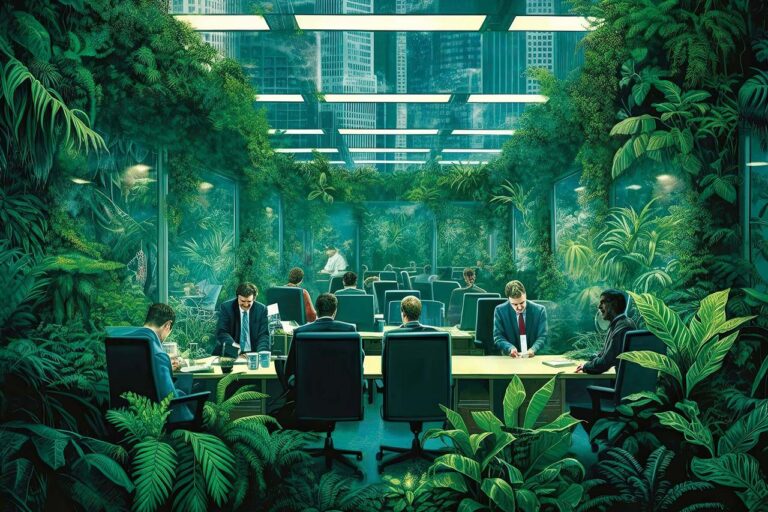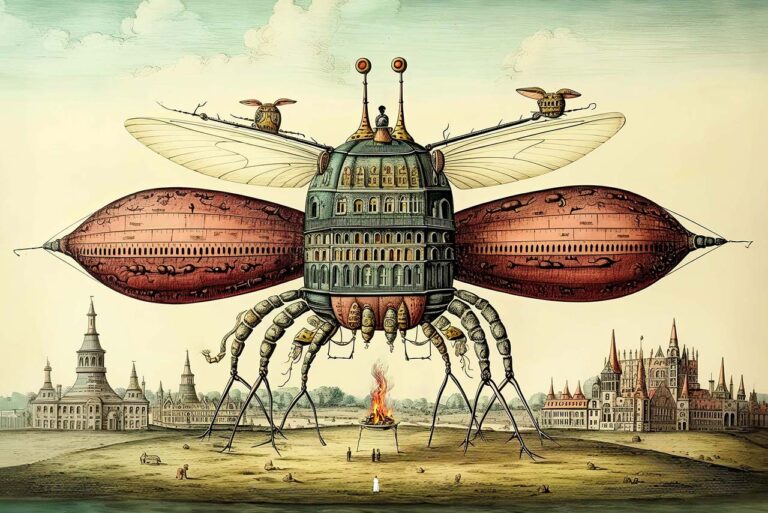
Info
- Digital artwork by Olio Imaginarium
- A series of 66 digital artworks
- Year: 2023
Artwork In brief
Discover ’Science & Nature,’ expansion of the ’World Expo 2050’ series, with 66 thematic islands showcasing scientific milestones, natural wonders, and architectural feats. This collection redefines museum exhibitions, offering immersive experiences within floating mini-universes, each full of life and detail.
The World Expo 2050 reimagines the concept of exhibition, moving beyond the traditional confines of museums to create spectacular themed floating islands—each a microcosm of human achievement and imagination. Inspired by the 1900 Paris World Affair, this monumental expo settles for nothing less than revealing the full spectrum of world’s wonders. For your convenience, the islands are neatly packaged into three parts: ’World Expo I: History & Culture,’ ’World Expo II: Science & Nature,’ and ’World Expo III: Art & Fantasy.’
While museums have long preserved and showcased historical artifacts, they have also been criticized as old-fashioned and uninspiring storehouses of knowledge. Welcome to the future, where museums have evolved into immersive worlds, offering a wealth of experiences. Each island is its own universe, limited only by the scope of imagination. Far more than exhibitions, these are ’universums’—mini-worlds where visitors immerse themselves in the pivotal themes of history, science, art, and culture. In these spaces, visitors are not just spectators but active participants in vibrant, living worlds.
Islands of Science
In the ’Islands of Science’ visitors get to explore the grand narratives of science and engineering. A prominent theme is the evolution of engineering, showcased through transportation vehicles, engines, factories, and industrial production methods. There are plenty of other disciplines represented as well. For example, there are islands dedicated to Darwin’s theory of evolution, genetics and cell biology, along with breakthroughs in physics such as electromagnetism and Einstein’s theory of relativity. The story of science unfolds from the mysterious experiments of medieval alchemists, advances through the milestones of the Industrial Revolution, and culminates in the cutting-edge explorations of space travel. Immersive experiential environments demonstrate how science can be a source of great joy.
Islands of Nature
The ’Islands of Nature’ are a testament to Earth’s natural variety, showcasing biomes from deserts to rainforests, mountains to aquatic zones, volcanic terrain to frozen tundras. Even better, you can now experience all of them—from the Sahara dunes to Arctic glaciers—on one expansive island. For added intrigue, these featured ecosystems teem with their native wildlife. One subset of islands is devoted to the art of gardening, presenting botanical gardens, zen gardens, and even the fabled Hanging Gardens of Babylon. Another prominent theme is the green city, offering a vision for building a more sustainable future.
Islands of Architecture
Lastly, the ’Islands of Architecture’ feature humanity’s grand construction endeavors, from ancient Rome to contemporary skyscrapers. Architecture demonstrates how we shape our natural environment into habitable spaces, informed by scientific progress. Begin your journey on an island that seamlessly blends modern skyscraper designs with ancient Chinese imperial architecture and Renaissance buildings. Then wander through islands dedicated to historical eras and styles, including interconnected floating 1800th century mansions, labyrinths of medieval castles, and a variety of Art Nouveau, High Renaissance, Baroque, Gothic, and oriental and exotic designs. Special historical legacy islands highlight the Great Wall of China, the architectural marvels of ancient Rome, and the towering pyramids of Mesoamerica.
See More
It seems there is no domain of humanity that an island cannot capture. Having designed over 200 theme islands for the ’World Expo 2050’, I am struck by the breadth of applications for the concept—yet it feels like we’ve only scratched the surface. Each island is a microcosm, a mini-universe centered around a singular idea, complete with its own intrinsic laws and workings. They package the vast spectrum of human history and culture into easy-to-understand segments, much like a delicious slice of pizza: easily digestible and topped with an endless variety of flavors. Hungry for more? Check the other parts of the series: ’World Expo I: History & Culture,’ and ’World Expo III: Art & Fantasy.’
Islands of science
In the ’Islands of Science’ visitors get to explore the grand narratives of science and engineering. A prominent theme is the evolution of engineering, showcased through transportation vehicles, engines, factories, and industrial production methods. There are plenty of other disciplines represented as well. For example, there are islands dedicated to Darwin’s theory of evolution, genetics and cell biology, along with breakthroughs in physics such as electromagnetism and Einstein’s theory of relativity. The story of science unfolds from the mysterious experiments of medieval alchemists, advances through the milestones of the Industrial Revolution, and culminates in the cutting-edge explorations of space travel. Immersive experiential environments demonstrate how science can be a source of great joy.
Islands of Nature
The ’Islands of Nature’ are a testament to Earth’s natural variety, showcasing biomes from deserts to rainforests, mountains to aquatic zones, volcanic terrain to frozen tundras. Even better, you can now experience all of them—from the Sahara dunes to Arctic glaciers—on one expansive island. For added intrigue, these featured ecosystems teem with their native wildlife. One subset of islands is devoted to the art of gardening, presenting botanical gardens, zen gardens, and even the fabled Hanging Gardens of Babylon. Another prominent theme is the green city, offering a vision for building a more sustainable future.
Islands of Architecture
Lastly, the ’Islands of Architecture’ feature humanity’s grand construction endeavors, from ancient Rome to contemporary skyscrapers. Architecture demonstrates how we shape our natural environment into habitable spaces, informed by scientific progress. Begin your journey on an island that seamlessly blends modern skyscraper designs with ancient Chinese imperial architecture and Renaissance buildings. Then wander through islands dedicated to historical eras and styles, including interconnected floating 1800th century mansions, labyrinths of medieval castles, and a variety of Art Nouveau, Baroque, Gothic, and oriental and exotic designs. Special historical legacy islands highlight the Great Wall of China, the architectural marvels of ancient Rome, and the towering pyramids of Mesoamerica.



